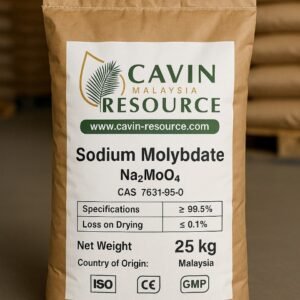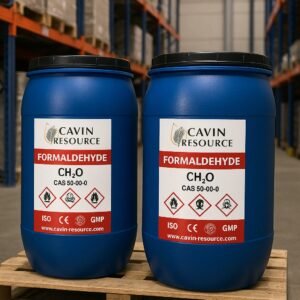Titanium Dioxide – High-Grade TiO₂
Original price was: $1,500.00.$1,400.00Current price is: $1,400.00.
Wholesale titanium dioxide suppliers
Titanium Dioxide (TiO₂) is a naturally occurring oxide of titanium and one of the most widely used white pigments in the world. Known for its exceptional brightness and high refractive index, it provides excellent opacity, whiteness, and UV protection in a variety of applications.
At Cavin Resource, we supply anatase and rutile grades of titanium dioxide with a purity of ≥99%, sourced from top global manufacturers. Whether you're producing coatings, plastics, cosmetics, inks, paper, or even food-grade materials, our TiO₂ is tailored for premium performance and regulatory compliance.
Our TiO₂ products meet ISO, FDA, and REACH standards and are available in bulk quantities for industrial and commercial buyers. We offer custom packaging options, provide COA and MSDS, and ship globally with full logistics support.
⚙️ Production Method
Sulphate and Chloride Process
Sulphate Process: Ilmenite or titanium slag is treated with sulfuric acid, producing titanium sulfate, which is then hydrolyzed, calcined, and micronized.
Chloride Process: Rutile or synthetic rutile is chlorinated at high temperatures to form titanium tetrachloride, which is then oxidized to produce TiO₂.
Both methods yield either anatase or rutile crystalline forms, depending on the processing route and intended end use.
🏭 Use Cases by Industry
🎨 Paints and Coatings
Primary white pigment in architectural paints, automotive coatings, and industrial finishes.
Offers excellent hiding power, brightness, and UV resistance.
🧴 Cosmetics and Personal Care
Used in sunscreens, makeup, and lotions for UV protection and whitening.
Non-reactive and safe for skin application.
🧃 Food Industry (Food Grade TiO₂)
Used as food coloring (E171) in candies, chewing gum, and dairy products.
🧫 Plastics and Inks
Enhances brightness and durability in PVC, polypropylene, and printing inks.
Improves weather resistance and extends product life.
✅ Key Benefits of Titanium Dioxide
🎨 Outstanding Whiteness and Opacity
☀️ UV-Blocking and Photostable
🧪 Chemically Inert and Non-Toxic (in approved grades)
🔬 Compatible with Various Matrices – Coatings, Plastics, Cosmetics
🌍 Globally Approved and Widely Used
📦 Packaging Options
25 kg paper/plastic multi-layer bags
500 kg jumbo bags
Custom bulk packaging available on request
COA, MSDS, and REACH documents included
❓ Frequently Asked Questions (FAQs)
1. What is the difference between anatase and rutile TiO₂?
Answer: Rutile TiO₂ offers better UV protection, higher durability, and is more suitable for outdoor paints and coatings, while anatase is softer and more suitable for cosmetics and indoor applications.
2. Is titanium dioxide safe in food and cosmetics?
Answer: Yes, when used within regulated limits. Food-grade TiO₂ (E171) and cosmetic-grade TiO₂ are deemed safe by the FDA, EFSA, and other global bodies.
3. Can I order titanium dioxide in bulk for manufacturing?
Answer: Absolutely. Cavin Resource supplies TiO₂ in bulk and wholesale quantities to global buyers, with full export and compliance support.
4. Is your TiO₂ compliant with international standards?
Answer: Yes. Our titanium dioxide complies with ISO, FDA, REACH, and EU cosmetic and food regulations, and is delivered with COA and MSDS.
📚 Credible Sources for Reference
Additional information
| Product Name | Titanium Dioxide (TiO₂) |
|---|---|
| CAS Number | 13463-67-7 |
| Molecular Formula | TiO₂ |
| Appearance | White powder |
| Purity | ≥99% |
| Grade | Anatase, Rutile, Food Grade, Cosmetic Grade |
| Crystal Form | Anatase / Rutile |
| Refractive Index | Rutile: ~2.7, Anatase: ~2.5 |
| HS Code | 3206111000 |
| Packaging | 25kg bags / Jumbo bags |
| Compliance | REACH, FDA, ISO, EU Cosmetics Directive |
| Shelf Life | 3 years |
| Solubility | Insoluble in water, soluble in acids |






Reviews
There are no reviews yet.